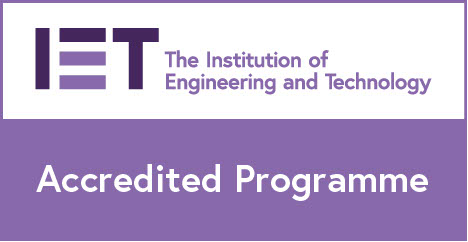Electromechanical Engineering
BEng Electromechanical Engineering
Degree Apprenticeship
Learn to solve real-world problems using a combination of mechanical and electrical engineering expertise
Electromechanical Engineers solve real-world problems using a combination of mechanical and electrical engineering expertise.
Our BEng Electromechanical Engineering degree apprenticeship is taught over five years and you’ll be learning while working in an exciting engineering role.
Watch the video above about the degree apprenticeship for more information.
Employers currently advertising vacancies include: BabcockLink opens in a new window, AtkinsRealis (Crewe),Link opens in a new window WSP UK LimitedLink opens in a new window.
Hear from our students
You can also read aboutLink opens in a new window Sophie's experience working for Schneider Electric.



















Electromechanical Engineers are able to solve real-world problems using a combination of mechanical and electrical engineering expertise. This occupation requires the understanding of software programming, the ability to interpret data, the use of a range of CAD and software tools, and the operation of mechanical systems via electrical, pneumatic or hydraulic means, in combination with project resources management responsibility.
We offer a unique programme that demonstrates a mix of electrical, mechanical and general engineering input and is designed to meet the evolving skills needed in this sector. In the first two years of the course you will cover the foundations of electromechanical engineering. In the third and fourth years you will focus on systems design, including a group design module.
In the final year you will have the opportunity to integrate your knowledge and understanding from the previous four years into your job role, carrying out a real-life electromechanical engineering project within your organisation.
The course has been developed to meet the requirements of the Degree Apprenticeship Standard for an Electro-mechanical Engineer and the specific needs of our industry partners, as well as addressing the widening skills gap in this sector.
Degree Apprenticeships combine the best aspects of higher education with vocational training. They offer a debt-free route to academic study whilst earning a salary, and allow apprentices to graduate ‘work-ready’ with experience on real-life projects.
Employers who regularly advertise degree apprentice opportunities in conjunction with our Electromechanical Engineering BEng include AtkinsRéalis, Cummins, DHL, Schneider Electric, RBSL and GE Vernova.
As a degree apprentice you will be a full salaried employee. You’ll be working as part of a team with real responsibility giving you hands-on, vocational training every day. At work, you will be supported in your role by both your line manager and employer mentor.
Our programme has been set-up to accommodation both school leavers (new entrants directly into the business) and existing staff (for upskilling).
A Level:
AAA grades at A level, to include Mathematics and a Physical Science. Applicants with strong profile, but without A level Mathematics will be subject to passing a Maths assessment
BTEC:
BTEC Diploma grade D*D*, with an A grade A level Mathematics, or subject to passing a Maths assessment
BTEC Extended Diploma grade DDD, including two Mathematics units or subject to passing a Maths assessment
Candidates with non-traditional qualifications will be considered on a case-by-case basis and will be dependent on the employer’s recruitment process, and subject to passing appropriate assessment on Mathematics set by The University of Warwick. We encourage applicants with non-standard qualifications to contact us to discuss their eligibility. For any questions relating to entry requirements please contact a member of the admissions team via eng dot apprenticeships at warwick dot ac dot uk.
A BEng degree requires students to be assessed on 360 credits of modules. Over the five years of the programme the module titles and their credit loadings are those listed below. 15 credit modules are for taught work that has blended teaching activities. The 30 and 60 credit modules are for project work that will be centred on integrated work based activities that you have had or will be experiencing on-the-job with your employer.
Year 1 (75 credits; five 15 credit Level 4 modules)
- Professional Engineering Competencies
- Statics and Dynamics
- Electrical Engineering Principles
- Engineering Design and Application
- Engineering Mathematics
Year 2 (75 credits; three 15 credit Level 4 modules and two 15 credit Level 5 modules)
- Materials and Manufacturing Processes
- Thermodynamics and Fluid Mechanics
- Systems Modelling and Simulation
- Applied Electronics (level 5)
- Engineering Mathematics and Data Analytics (level 5)
Year 3 (75 credits; five 15 credit Level 5 modules)
- Engineering Management
- Electromechanical System Design and Control
- Power Electronics
- Mechatronics and System Control
- Dynamics and Vibrations
Year 4 (75 credits; three 15 credit Level 6 modules and a 30 credit Level 6 module)
- Applied Thermodynamic Engineering
- Digital and Embedded Systems
- Electrical Machines and Drives
- Group Project (30 credit)
Year 5 (60 credit Level 6 module)
- Individual Project
The exact make-up of the Electromechanical Engineering Degree Apprenticeship programme will be developed in partnership with your employer, and this may result in minor alterations to this structure and/or individual modules.
Degree apprenticeships offer apprentices a debt-free route to academic study whilst earning a salary. As an employee of a company, the University fees will be funded by way of the UK government's Apprenticeship Levy, and this funding will be part of your employment conditions.
If you’re over 16 and live in England then you may be eligible to undertake a Degree Apprenticeship. Citizens of EEA countries, or non-EEA citizens legally resident in the UK for at least the previous three years before the start of the apprenticeship (NOT for educational purpose), may also be eligible.



The BEng Electromechanical Engineering Degree Apprenticeship (EMDA) is accredited by the Institution of Engineering and Technology (IET), the Institution of Mechanical Engineers (IMechE) and the Institution of Measurement and Control (InstMC). Full information is available here.
The IET is scheduled to review a number of our Engineering programmes during 2026 as part of the accreditation process.
Essential information
Duration
BEng 5 years full time
Location of study
University of Warwick, Coventry
Tuition fees
Paid by your employer
How to apply
To apply for a degree apprenticeship you will need to find a vacancy with an employer. Check out our apprenticeship vacancy page .
Enquiries
For enquiries on this School of Engineering degree programme, please contact eng dot apprenticeships at warwick dot ac dot uk
This information is applicable for 2025 entry.
